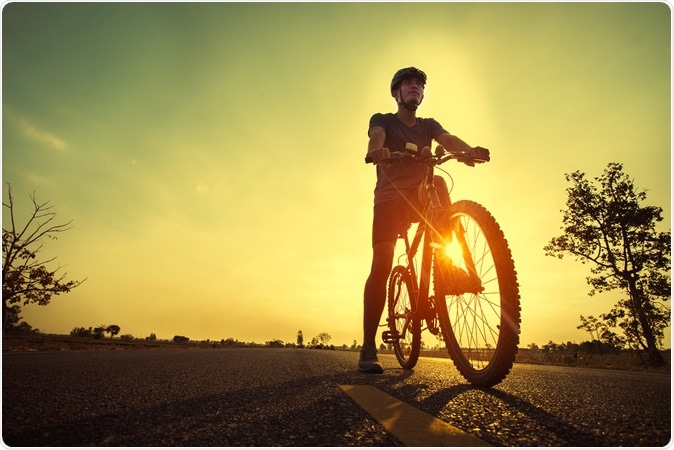A latest study has found that long hours of cycling do not negatively impact sexual and urinary health in men unlike popular belief. The researchers find that the benefits that cycling has on the cardiovascular system of individuals far outweighs any perceived potential risks.
The study from the Department of Urology, University of California-San Francisco was published in the latest issue of the Journal of Urology.

Image Credit: Tinny Photo / Shutterstock
This was a multinational study involving people from several nations. The team of researchers looked at three groups of athletes including cyclists, runners and swimmers. The impact of these sports on the urinary and sexual function in men was studied. There have been anecdotal reports and studies that have implicated prolonged hours of cycling in causing erectile dysfunction. This was speculated to have been caused due to continued pressure over the perineum of the men (area under the scrotal sac in front of the anus) causing trauma. This new study planned on looking at the reality of this theory. They write that these previous studies were all small and did not use comparator individuals to be of sound benefit to science. According to lead investigator of this new study, Benjamin Breyer, this new study was the “largest comparative study to date” that used validated questionnaires to test for sexual and urinary functions in men who cycled for long hours. The team also looked at the health implications of cycling taking into consideration the bikes used and the terrains navigated on the bikes.
This new study looked at 2,774 cyclists, 539 swimmers, and 789 runners. These athletes were all given sets of questions related to their sexual health and previous incidences of urinary tract infections (UTIs). Standard questionnaires used included Sexual Health Inventory for Men (SHIM), International Prostate Symptom Score (I-PSS), and National Institutes of Health Chronic Prostatitis Symptom Index (NIH-CPSI). They were asked to answer questions regarding urethral strictures they may have had previously. These are scars over the urethra that are caused due to previous injury and inflammation that results in poor healing. Strictures are problematic issues which lead to impaired urine flow and result in frequent urinary tract infections. They were also asked questions regarding genital numbness and saddle sores. They were asked questions about the intensity of their cycling, types of bikes used, bike configuration, type and angle of the saddle, whether or not they wore padded shorts while cycling, time spent standing out on the saddle, heights of the handle bars and the surfaces the athletes commonly ride with their bikes. They were compared to non cyclists who do not cycle on a regular basis but swim and run.
Results revealed that cyclists did not have more urinary and sexual health problems compared to swimmers or runners. They however were more prone to urethral strictures. Genital numbness was significantly reduced among those who stood on the saddles for longer periods of time (20 percent of the ride time), they noted. If the handle bars were higher or at the same level as the saddles, the chances of genital numbness and saddle sores were also reduced. Type of bikes or roads did not affect the cyclists in a negative way found the study.
Breyer added that this study would encourage more people to take up cycling. It is a greatly beneficial exercise for heart health as well as keeping the joints healthy. The benefits he added were far greater than any potential risks.